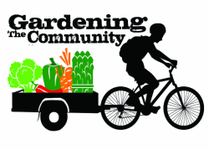Volunteer Opportunities!
Volunteering opportunities are available during the growing season at our main site, 200 Walnut St. Springfield, MA 01105. All volunteers should meet at our main site, unless otherwise noted. For our typical volunteer workdays, we have volunteers help us with tasks such as harvesting, seeding, weeding, planting, etc. See our FAQ below for more details. Interested in signing up? Have questions? Email [email protected]!
Volunteering opportunities are available during the growing season at our main site, 200 Walnut St. Springfield, MA 01105. All volunteers should meet at our main site, unless otherwise noted. For our typical volunteer workdays, we have volunteers help us with tasks such as harvesting, seeding, weeding, planting, etc. See our FAQ below for more details. Interested in signing up? Have questions? Email [email protected]!
A huge thank you to Harvard Pilgrim Health Care Foundation for helping strengthen our volunteer program!
FAQ - Volunteering at GTC
We are very grateful for the many people who generously volunteer their time and energy to work with us out on our sites. We encourage groups (big and small) and individuals to come lend their skills and pitch in alongside us. We also have opportunities for people to volunteer by joining a committee, working with us on an event, doing office/data entry work and research. Please see all of our current volunteer opportunities above!
1. What do volunteers do?
On the farm, volunteers help with tasks such as preparing beds, planting, weeding, harvesting, and cleaning up the land. Volunteers should expect to work hard and get their hands and clothes dirty by the end of the day.
2. What should volunteers bring?
For farm work, volunteers should bring a water bottle, sunscreen, work gloves, and rain gear (if necessary). Gardening the Community will supply all tools necessary to work in the field. If you have a medical condition such as asthma or anaphylaxis, please bring your inhaler or epi-pen and notify staff of your condition before working in the field.
3. What should volunteers wear when working?
All volunteers must wear close-toe shoes. Volunteers should also wear clothing that can get dirty. Long pants and shirt are recommended for farm work. Also, volunteers should be prepared for warm, cold, or wet weather and should be prepared with extra layers and rain gear.
4. What happens when it rains?
Volunteer sessions will continue if it rains. Volunteers should bring rain gear if precipitation is in the forecast. The staff will cancel or stop working if weather conditions are dangerous or not conducive to field work.
5. Is water available at the farms?
There is a faucet available at our Walnut St. site and drinks for sale in the Farm Store. We recommend you bring your own water bottles to refill to reduce the usage of disposable cups and single use plastic water bottles.
6. Is lunch available at the farms?
Gardening the Community does not provide or sell lunch to volunteers. We do invite volunteers to bring their own lunch, order lunch nearby, or purchase something from our Farm Store - we carry drinks, fruit, vegetables and some snacks, but not prepared foods such as sandwiches. There are tents and benches for volunteers to sit and enjoy their food.
7. Is there a bathroom available?
There is a bathroom available at our Walnut St. site inside of the Farm Store. If you are working on a one of our other sites you will have time to use the bathroom before departure.
8. How can I learn about future volunteer opportunities?
If you would like to receive volunteering updates from GTC, please text "VOLUNTEER" to 56525.
Contact [email protected] if you have other questions!
On the farm, volunteers help with tasks such as preparing beds, planting, weeding, harvesting, and cleaning up the land. Volunteers should expect to work hard and get their hands and clothes dirty by the end of the day.
2. What should volunteers bring?
For farm work, volunteers should bring a water bottle, sunscreen, work gloves, and rain gear (if necessary). Gardening the Community will supply all tools necessary to work in the field. If you have a medical condition such as asthma or anaphylaxis, please bring your inhaler or epi-pen and notify staff of your condition before working in the field.
3. What should volunteers wear when working?
All volunteers must wear close-toe shoes. Volunteers should also wear clothing that can get dirty. Long pants and shirt are recommended for farm work. Also, volunteers should be prepared for warm, cold, or wet weather and should be prepared with extra layers and rain gear.
4. What happens when it rains?
Volunteer sessions will continue if it rains. Volunteers should bring rain gear if precipitation is in the forecast. The staff will cancel or stop working if weather conditions are dangerous or not conducive to field work.
5. Is water available at the farms?
There is a faucet available at our Walnut St. site and drinks for sale in the Farm Store. We recommend you bring your own water bottles to refill to reduce the usage of disposable cups and single use plastic water bottles.
6. Is lunch available at the farms?
Gardening the Community does not provide or sell lunch to volunteers. We do invite volunteers to bring their own lunch, order lunch nearby, or purchase something from our Farm Store - we carry drinks, fruit, vegetables and some snacks, but not prepared foods such as sandwiches. There are tents and benches for volunteers to sit and enjoy their food.
7. Is there a bathroom available?
There is a bathroom available at our Walnut St. site inside of the Farm Store. If you are working on a one of our other sites you will have time to use the bathroom before departure.
8. How can I learn about future volunteer opportunities?
If you would like to receive volunteering updates from GTC, please text "VOLUNTEER" to 56525.
Contact [email protected] if you have other questions!
